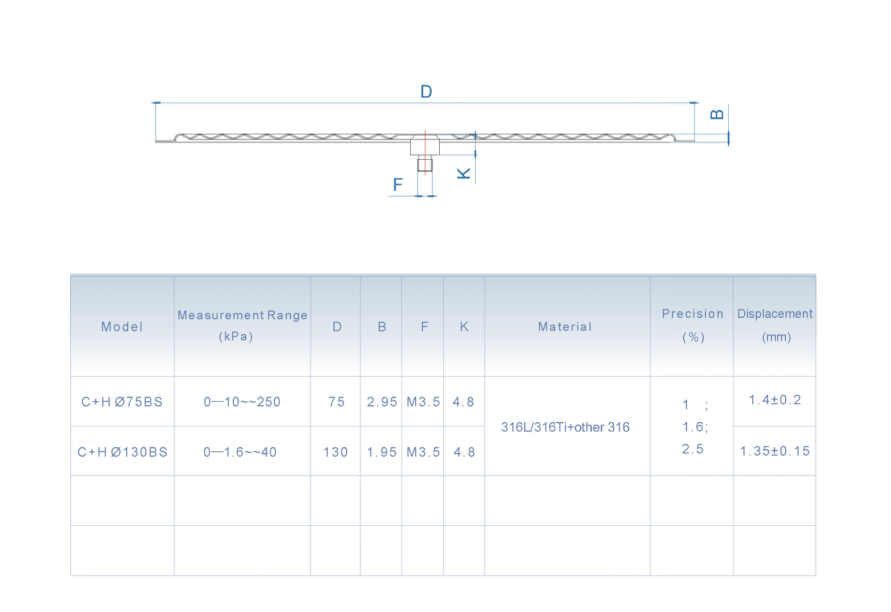
7 月 . 27, 2024 22:16 Back to list
Suppliers of Pressure Gauges Featuring Diaphragm Seal Technology for Enhanced Measurement Accuracy
Understanding Diaphragm Seal Type Pressure Gauge Suppliers
Pressure gauges are instrumental in a wide range of industries, providing critical measurements that ensure the safe and efficient operation of various equipment and processes. Among the many types of pressure gauges available, diaphragm seal type pressure gauges have gained prominence for their adaptability and reliability in challenging environments. This article explores the features and benefits of diaphragm seal type pressure gauges, and highlights the role of suppliers in the market.
What is a Diaphragm Seal Type Pressure Gauge?
A diaphragm seal type pressure gauge consists of a pressure gauge connected to a diaphragm seal, which acts as a barrier between the measuring element and the process media. This configuration is particularly beneficial when dealing with corrosive, viscous, or high-temperature fluids. The diaphragm, typically made of materials such as stainless steel or Hastelloy, deflects under pressure, transmitting the force to the gauge mechanism, typically through a filled connection. This setup not only protects the measurement system from harsh media but also minimizes the risk of contamination.
Advantages of Diaphragm Seal Type Pressure Gauges
1. Protection Against Corrosive and Contaminated Media Diaphragm seals prevent direct contact between the process media and the gauge, which is crucial when dealing with corrosive substances that could damage the internal components of a traditional gauge.
2. Accuracy and Reliability These gauges are praised for their accuracy and stability, providing reliable readings even in fluctuating conditions. This is essential in industries where precise measurements are critical, such as pharmaceuticals, chemicals, and food processing.
3. Versatility Diaphragm seal type pressure gauges can handle a wide range of pressures and temperatures, making them versatile across different applications. They can be used in various settings, from high-pressure systems to low-pressure applications.
4. Ease of Maintenance The design of diaphragm seals simplifies maintenance. Because the media does not contact the internal components of the gauge, there is less wear and tear, leading to longer service intervals and reduced downtime.
diaphragm seal type pressure gauge suppliers

Choosing the Right Supplier
When it comes to acquiring diaphragm seal type pressure gauges, selecting a reliable supplier is crucial. The supplier should have a proven track record of quality and service, providing products that meet industry standards. Here are some factors to consider
1. Product Range A good supplier will offer a variety of diaphragm seal gauges with different sizes, pressure ranges, and materials tailored to various applications. This allows buyers to find a product that meets their specific needs.
2. Customization Options Many applications require customized solutions. Suppliers that offer customization — whether in terms of materials, sizes, or connection types — allow for a more tailored approach to specific operational needs.
3. Technical Support A knowledgeable supplier provides significant value, offering technical support and advice on product selection, installation, and maintenance. This can be critical in ensuring optimal performance and avoiding potential issues.
4. Certifications and Standards Ensure that the supplier’s products comply with industry regulations and standards. Certifications like ISO or ASME can indicate reliability and quality.
5. Reputation and Reviews Researching the supplier’s reputation within the industry can provide insights into their commitment to quality and customer service. Reading customer reviews and testimonials is an effective way to gauge reliability.
Conclusion
Diaphragm seal type pressure gauges are essential tools in various industries, promoting safety and efficiency in processes involving hazardous or sensitive media. As industries continue to evolve, the demand for such gauges will grow, highlighting the importance of selecting the right supplier. By considering factors such as product range, customization, technical support, and reputation, businesses can ensure they partner with suppliers who meet their operational needs effectively and reliably.
-
AG Precision Pressure Gauges High Accuracy & Global Exporters
NewsMay.21,2025
-
Ashcroft Diaphragm Pressure Gauges Precision & Durability
NewsMay.21,2025
-
Micro Differential Pressure Gauges High-Precision & Compact Solutions
NewsMay.20,2025
-
Pressure Gauges with Diaphragm Seals High-Accuracy & Corrosion-Resistant
NewsMay.20,2025
-
Capillary Type Differential Pressure Gauge Precision Measurement Solutions
NewsMay.19,2025
-
Diaphragm Seal Pressure Gauges High Accuracy & Corrosion Resistance
NewsMay.19,2025
